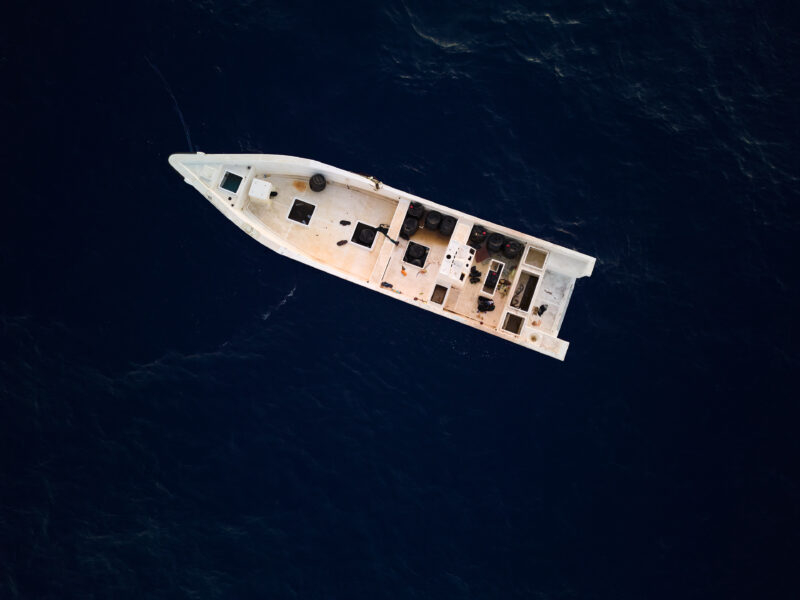Press Release on the publication of SOS Humanity’s new position paper

Position paper “Rescue Refugees Instead of Outsourcing Protection to Third Countries”
Berlin, 10 December 2024 – To prevent people from fleeing across the Central Mediterranean and keep them away from the EU, the European Union and its member states are increasingly outsourcing border control and asylum procedures to third countries. They are thereby supporting human rights violations against people on the move by spending millions of taxpayers’ money: from 2016 until 2027, the EU and its member states will have invested at least 327.7 million euros in the border management of Libya and Tunisia.
Instead of rescuing people on the move, the EU and its member states are outsourcing border control and refugee protection to third countries, as is the case in the Central Mediterranean with Tunisia, Libya and Albania. The externalisation includes support to the so-called Libyan and the Tunisian Coast Guards who carry out illegal pull-backs and are responsible for grave human rights violations against refugees. In its position paper published today, SOS Humanity calls for an end to externalisation policy in the field of search and rescue that leads to the violation and restriction of refugee rights and demands that the EU and its member states protect the right to asylum.
“This policy, funded by tax money, is problematic and dysfunctional in several ways: it is overly expensive, jeopardises the rule of law and leads to serious human rights violations. The protection of refugees is outsourced and turned upside-down into illegal refoulement, arbitrary detention and the denial of the right to asylum. This externalisation is a scandalous erosion of European values, international and European law”, criticises Marie Michel, political expert of SOS Humanity.
Illegal pull-backs of refugees to Libya
Although different courts have repeatedly confirmed that the EU-supported Libyan rescue coordination centre and the so-called Libyan Coast Guard do not carry out maritime rescue operations according to international law*, the European Union and its member states support and finance these doubious Libyan actors. The European border agency Frontex and the European coastal states such as Italy and Malta are cooperating with Libyan actors who forcefully intercept refugees at sea and illegally bring them back to Libya. Thereby, the EU and its member states make themselves complicit in systematic and severe human rights violations against refugees and migrants in Libya that the United Nations (UN) Independent Fact-Finding Mission on Libya classifies as crimes against humanity. Preventing people from fleeing curtails their right to asylum and causes suffering and thousands of deaths at the EU’s external border in the Central Mediterranean Sea.
Financed and equipped by the EU and its member states, the so-called Libyan Coast Guard has illegally returned more than 144,800 refugees between 2016 and November 2024** who tried to flee across the Mediterranean from the “Libyan hell”, which is how Libya has often been described by survivors.
Illegal pull-backs of refugees to Tunisia
Despite a dramatically deteriorating human rights situation, the EU and its member states stepped up their cooperation with Tunisia by outsourcing border control and search and rescue activities to Tunisian authorities. Tunisia was promised 105 million euros for border and migration control by the EU in the new Memorandum of Understanding of 2023. However, the disembarkation of people rescued from distress at sea in Tunisia violates international law, as Tunisia cannot be considered a place of safety.
Nevertheless, the EU supported the establishment of a Tunisian search and rescue (SAR) region in June 2024, leading to an increase in interceptions of people fleeing and their illegal returns to Tunisia by the Tunisian Coast Guard. These actors reportedly endangered the lives of refugees by engaging in high-speed manoeuvres that threaten to capsize the boats, physical violence, the use of tear gas at close range and intended collisions with boats.
Novelty: Externalisation of asylum procedures
Moreover, since 2023, new forms of externalisation, such as the Italy-Albania Protocol to outsource asylum procedures to third countries, have proven unfeasible. The costs of the agreement amount to 653 million euros over five years, and currently, the deal seems to be on hold
SOS Humanity demands that the EU and its member states end the support of the so-called Libyan and the Tunisian Coast Guards and stop their complicity in human rights violations. Instead, the EU and its member states have to protect the right to asylum.

on “Rescuing people instead of outsourcing refugee protection to third countries – End the EU’s Externalisation Policy!” is available here.
SOS Humanity: Petra Krischok: press@sos-humanity.org, +49 (0) 176 552 506 54
of the Humanity 1 search and rescue operations from 2022 till today can be found under this link .
We have one slot reserved onboard Humanity 1 for journalists. Please contact our Press Team for more information!

